[2025 Edition] Best 8 Algolia Alternatives and Competitors
Looking to improve your store’s engagement and conversions? This article compares Algolia to its top 8 alternatives so you can pick the best option for your brand.
What we cover:
- Why look for Algolia alternatives?
- What are the best alternatives to Algolia?
- Power delightful search experiences with Big Sur AI
TL;DR
→ Algolia is an AI-powered search-as-a-service tool. It consists of two main components:
- Search implementation tools that help developers build and maintain seamless search experiences for users.
- Search analytics tools that businesses use to analyze the impact of website and in-app search so they can refine them for better results.
→ Big Sur AI is the best Algolia alternative for e-commerce brands. With its AI sales agent that enables conversational product discovery, Big Sur AI transforms merchant websites into conversion-optimized platforms. The app also has other AI-driven capabilities like user prompts, product recommendations, and analytics which streamline user engagement and boost sales.
→ If you’re looking for a more generic alternative for both employees and customers across industries, Yext or Coveo should be your go-to. They are not purpose-built for just e-commerce, but they work great for overall digital experience management.
Why look for Algolia alternatives?
Before going into our list of alternatives, let’s explore Algolia’s strengths and reasons you might want another option regardless.
Algolia’s strengths
Algolia’s biggest strength is how well it connects with third-party tools in your tech stack, from API clients to front-end libraries, software frameworks, and integration platforms.
→ The app addresses a wide range of business types, including B2C and B2B e-commerce brands, marketplaces, media companies, and SaaS solutions.
→ Algolia also offers free tools for estimating its potential impact on your business profit and evaluating how good your overall search experience is. These insights help you make the user experience more intuitive, retaining online shoppers and increasing your average order value (AOV).
Reasons why Algolia customers look for alternatives
As great as Algolia is, the software is not without its limitations. Here are some top user problems with the app:
1. Limited ranking customization
Algolia’s algorithm is modern and intuitive but some deep search ranking customizations are not possible with it as it works differently from traditional elastic-based search.

2. No official MySQL database integration
Syncing products between Algolia and a MySQL database is complex and time-consuming.

These challenges are largely due to Algolia’s MySQL connector feature still being in the beta phase pending its official launch.
3. Difficult to set up and navigate
One common Algolia user complaint is that the app is difficult to configure and use, especially without the help of a software developer.


Even developers often struggle to utilize the platform’s weighting preferences and custom fields fully.

Another dealbreaker for some users is that finding newly created categories or setting up link redirects on the app.

The user interface of Algolia’s search API logs is also complex and difficult to use.
4. Price concerns when scaling up
For some, the cost is the biggest drawback of using Algolia.

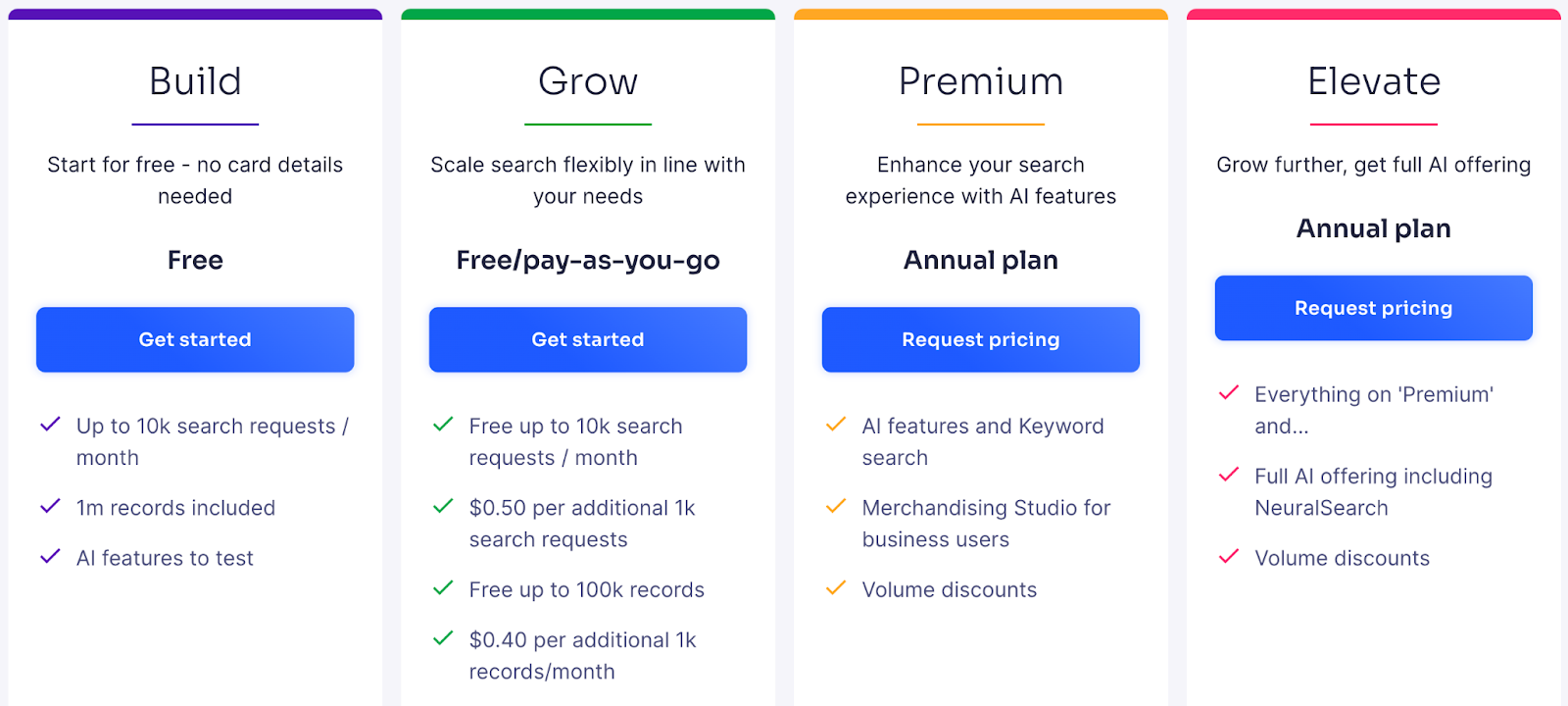
While the app is free to set up and for up to 10,000 search requests per month and 100,000 records, its pay-as-you-go pricing gets quite expensive as site traffic and search engagement grows.
What are the best alternatives to Algolia?
We analyzed reviews and comparison posts across the internet to create this list of the best alternatives to Algolia in 2025.
- Big Sur AI – E-commerce AI platform for customer engagement and sales
- Nosto – E-merchandising and content personalization
- Bloomreach – Omnichannel marketing automation
- Doofinder – Shopify site search
- Yext – Digital presence management for multi-location brands
- HawkSearch – Multiple search options (keyword, concept, visual, and image)
- FactFinder – Conversion rate optimization
- Coveo – AI search and generative experiences
Let’s assess each one in detail.
#1 - Big Sur AI
Big Sur AI tops our list because it’s easy to set up, purpose-built for e-commerce, and user-friendly. These attributes make it an easy choice for Algolia customers looking to jump ship.
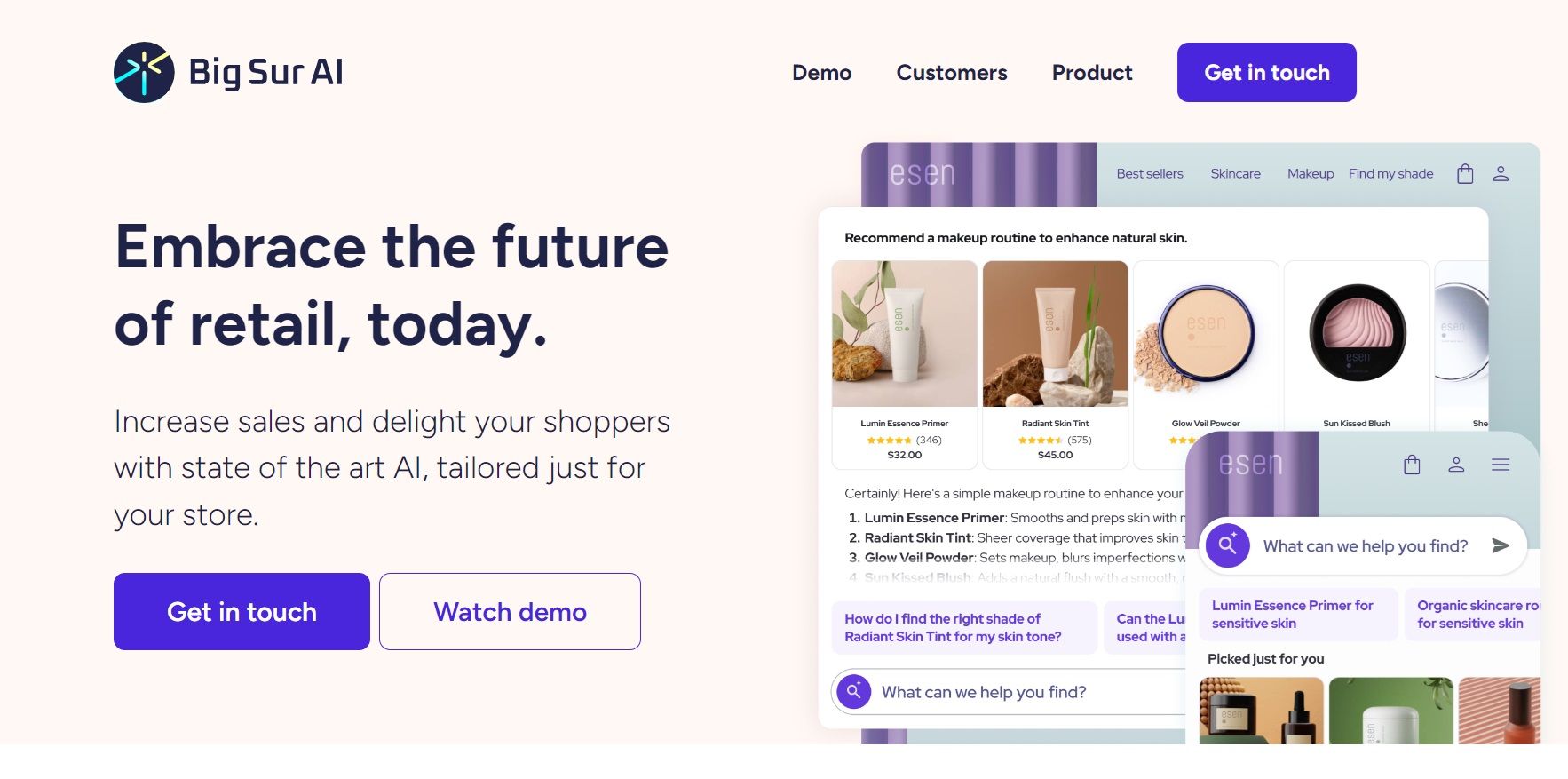
Big Sur AI is an AI-driven platform that lets brands offer real-time assistance and personalized product recommendations to customers.
Unlike Algolia and many of its other alternatives, Big Sur AI isn’t a generalized, industry-agnostic solution. Instead, it focuses on e-commerce brands, giving them tools to help their customers find the right products quickly and ultimately boost conversions.
So far, Big Sur AI has significantly increased conversion rates for top clients like dpHUE and Wyze.
But what exactly makes Big Sur AI so good?
See for yourself ⤵️
Big Sur AI’s Features
Big Sur AI provides multiple product search and discovery features, custom-built to increase customer engagement and conversion rates.
1. AI sales agent
One of Big Sur AI’s most critical functionalities, the AI sales agent is a conversational product discovery assistant that you can set up on your e-commerce store.

It lets you easily recreate a customer's experience talking to a product-savvy salesperson – without the overhead cost.
Once Big Sur AI’s sales agent is live on your online store, the entry point is usually a chat bar at the bottom or middle right of the screen. By clicking the bar, users can have natural language conversations with your brand, asking open-ended questions and getting instant answers from a predefined set of recommendations.
You can customize the AI sales agent chat window to fit your brand style and display conversation starters to engage store visitors, proactively reducing drop-off rates.
This feature's main purpose is to increase sales. So, during customer conversations, it also suggests subsequent questions for users to ask and provides personalized product recommendations, all optimized for conversions.
Check out this short product tour to see the AI sales agent in action.👇
2. AI product recommendations
Another big advantage of Big Sur AI is its AI product recommendations, which show on product pages based on each user’s journey.
These recommendations are broken into three modules and are shown to users according to the page they’re on and how they got there:
- Picked just for you: This module displays a selection of products that a user is most likely to buy based on what we know about them.
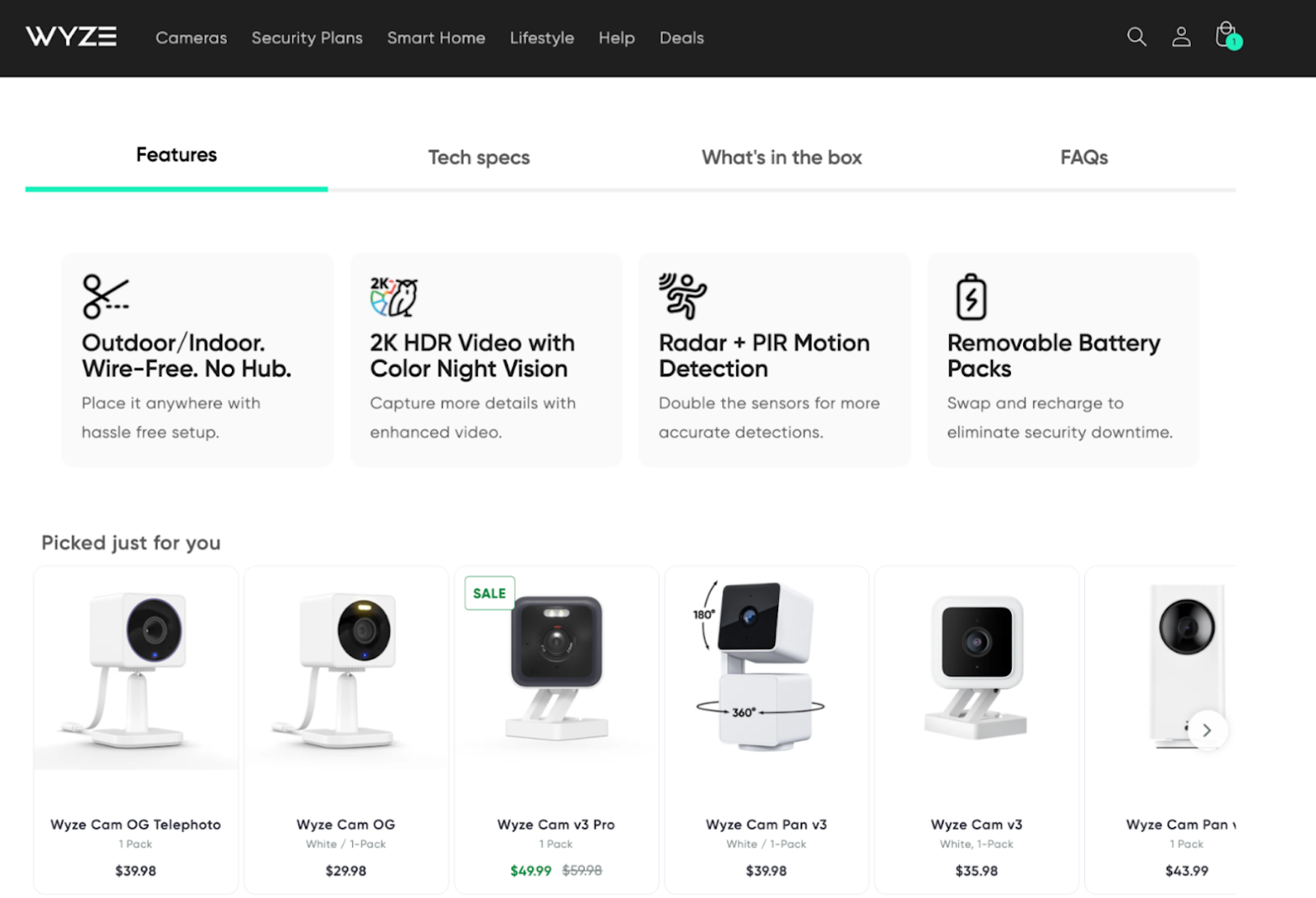
- Frequently bought together: These recommendations appear once a user adds a product to their cart. They feature other products that customers typically buy along with the product that was just added to the cart.
- Top sellers: Here, we show bestsellers in the same product category as the product a user is considering. For example, if a user is browsing the product page of a specific party shoe, this recommendation module shows the most commonly bought party shoes the brand sells.
The best part of this Big Sur AI feature is how it lets you expose your full range of products, driving cross-sells and upsells.
3. Conversion-optimized AI prompts
Unlike Algolia, which primarily focuses on AI recommendations and category building, Big Sur AI offers the added benefit of conversion-optimized AI prompts (also called AI corner).
AI corner is a module of suggested questions that is embedded on product and category pages.
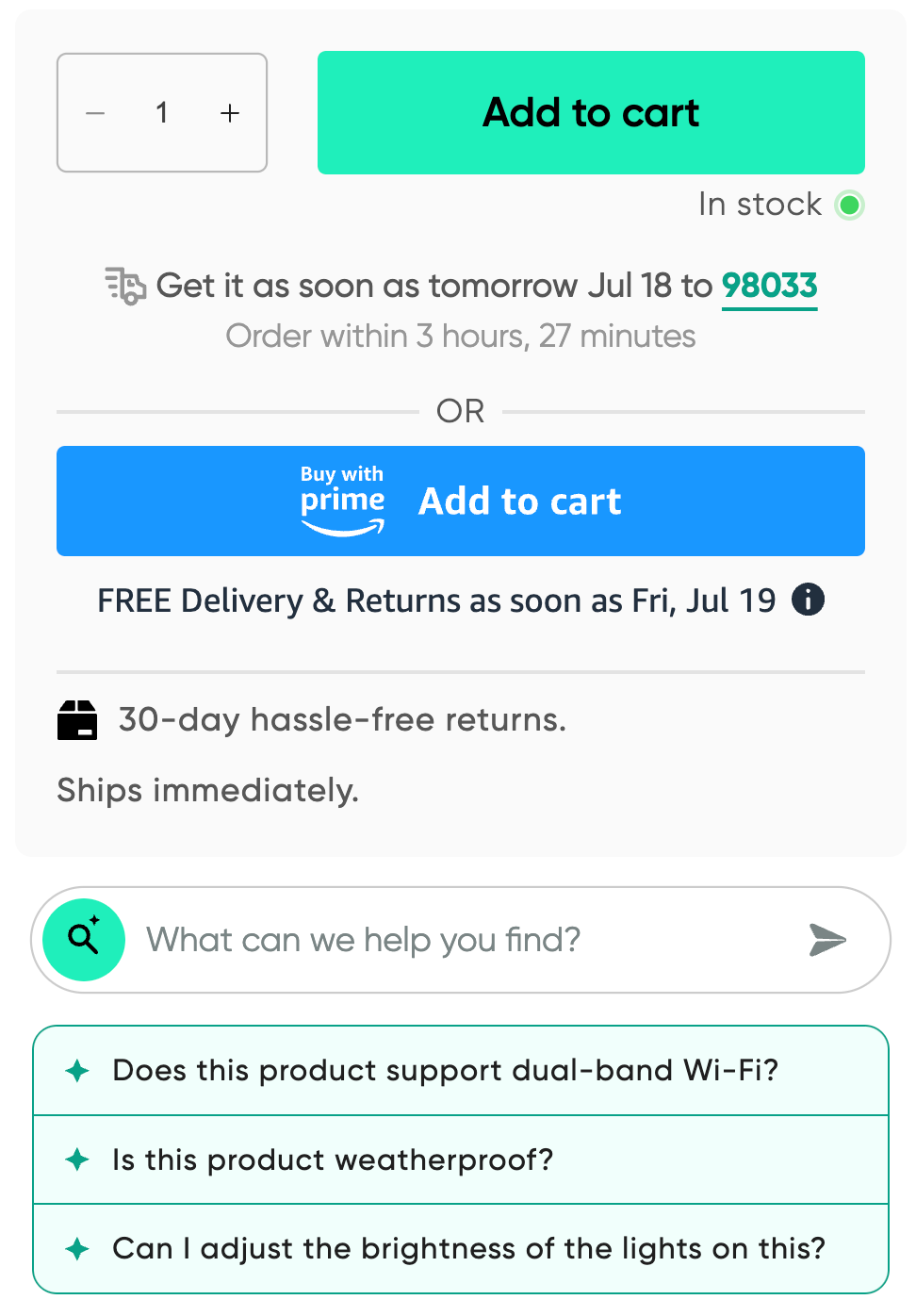
These questions are personalized to individual users based on their current page and shopping journey and history on your site. Hence, each user sees a different set of questions on the same page depending on how they ended up there.
Similar to the AI sales agent, this functionality is also conversion-optimized, so it displays questions by how likely the topic is to drive user engagement and trigger a purchase.
4. Merchant insights
Big Sur AI enables thousands of new natural language conversations that would have been difficult to capture using traditional user research methods. It also offers a comprehensive set of performance analytics and conversation insights that help you optimize your store.
On the performance analytics side, Big Sur AI shows you:
- A comparison of conversion rates for your overall store vs. users who interact with the Big Sur AI sales agent.

- Funnel data for users who interact with the sales agent (user queries, items added to cart, or orders placed).
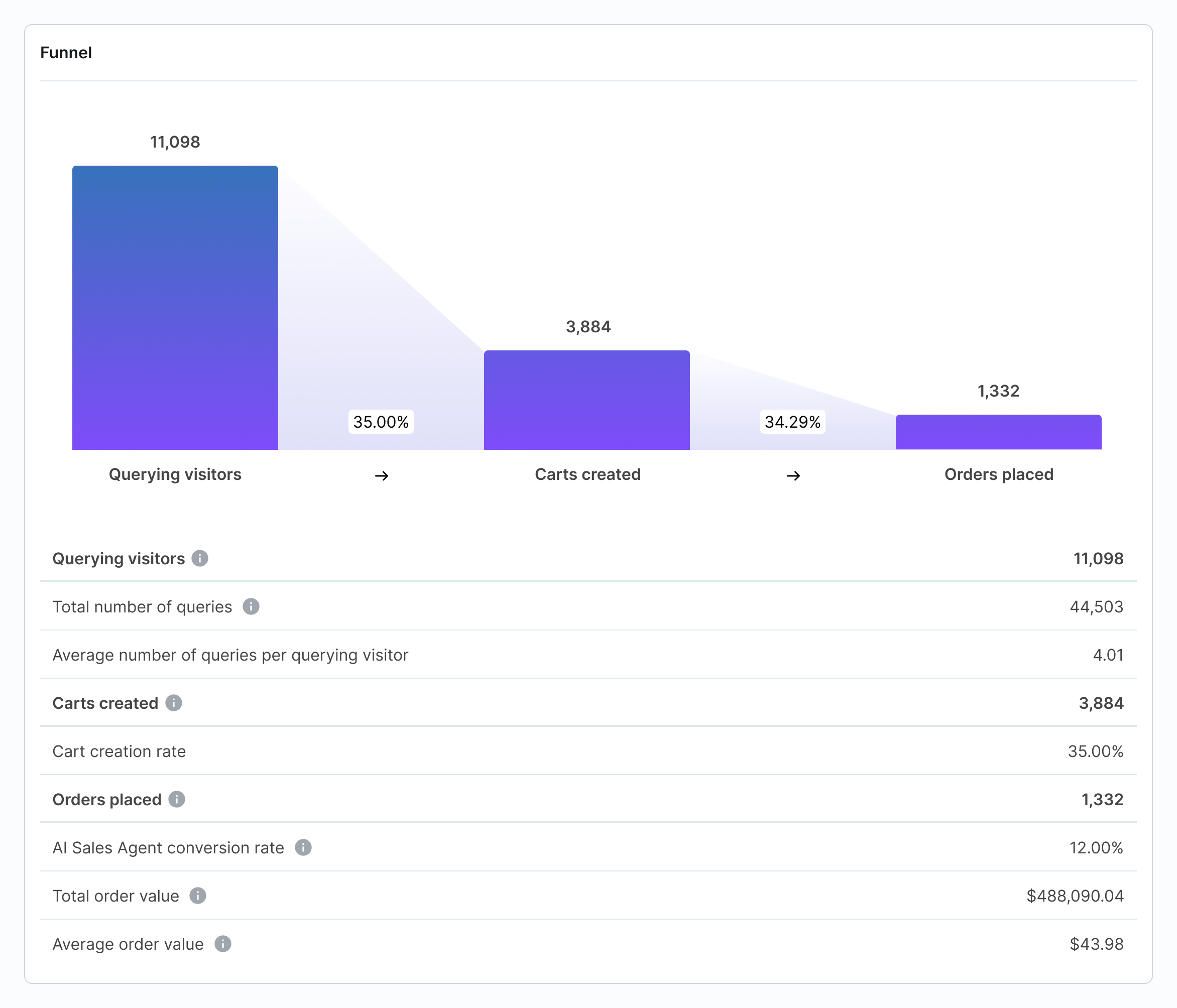
- Top-selling products across your store.

- Items frequently bought together with a given product.

And for conversation insights, you get access to:
- Top user questions (categorized by topic).
- Questions most likely to drive conversions.
- Questions that lead to drop-offs.
- Top questions per product.

How does Big Sur AI compare to Algolia?
Big Sur AI offers many extra benefits compared to Algolia. Here’s a quick overview ⤵️

Algolia drives search usage and revenue via its hybrid search engine (its API includes both semantic and keyword searches). But, it isn’t hyper-focused on boosting sales or AOV for e-commerce merchants.
Additionally, customers report that Algolia’s setup can be troublesome for non-technical teams.
Big Sur AI’s dedication to user experience and improving conversions puts it ahead of competitors like Algolia.
Big Sur AI’s pros and cons
✅ Advanced machine learning algorithm
Big Sur AI understands any natural language query. It also gives high-quality answers to complex questions, offers recommendations in a friendly tone, and provides actionable insights.
✅ User-friendly interface
The app does not require any complex tech setup so you can integrate it with your store in minutes. It's also ready to handle concurrent search queries and any traffic volume, offering a welcoming, on-brand chat window for your users.
✅ Optimized for higher conversion rates and average order value
All Big Sur AI features are conversion-optimized, so it’s a platform built specifically to help your e-commerce business sell more products and generate higher profits.
❌ Does not service a wide range of industries
Unlike Algolia, Big Sur AI does not cater to multiple industries — it focuses on e-commerce brands and online retailers.
❌ Limited integrations
While Big Sur AI is an ideal search and discovery platform for e-commerce companies looking to boost store engagement and conversions, it does not offer as many integrations as Algolia.
#2 - Nosto
Nosto is an e-commerce personalization platform that helps online sellers deliver unique shopping experiences. Its technology studies customer behavior and shopping data to provide personalized product recommendations, content, and marketing campaigns.
Best for: E-merchandising and content personalization.
Similar to: Dynamic Yield, Insider.
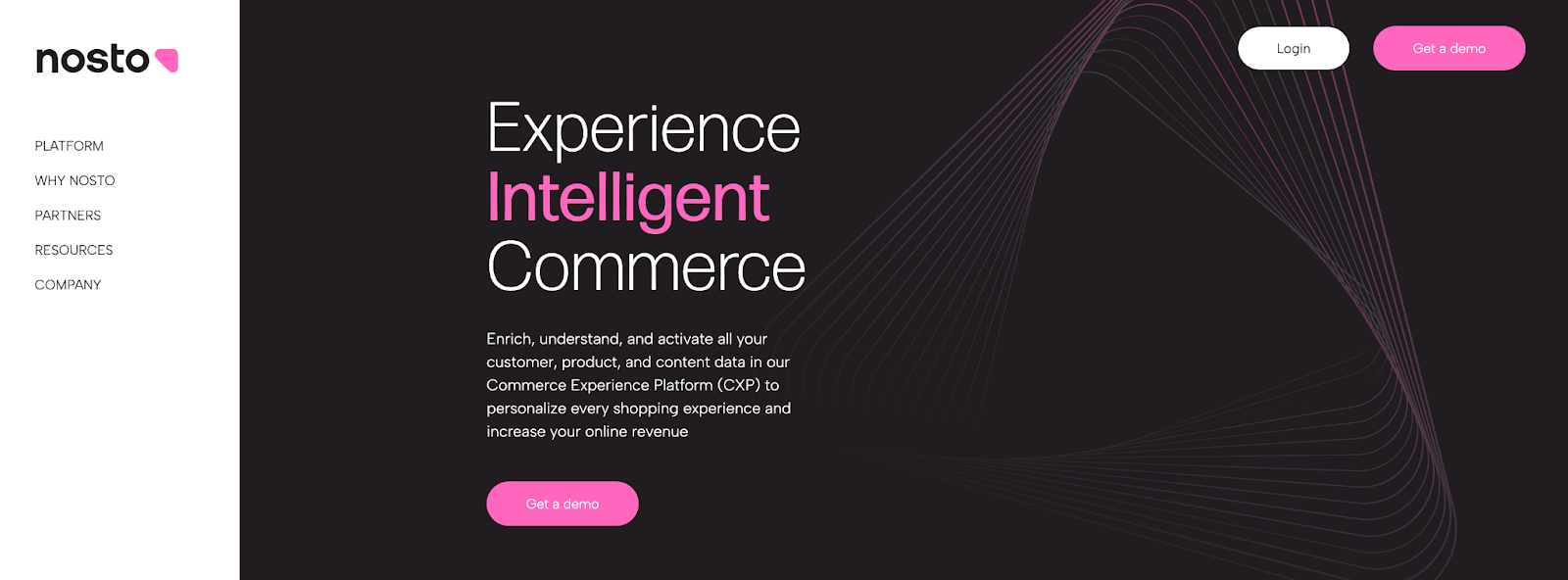
Unlike Algolia and some other solutions on this list, Nosto does not focus on just search experiences.
Instead, the brand positions itself as a full-stack “commerce experience platform”, using advanced segmentation technology to target and reach customers on various digital channels.
Who is it for?
Nosto serves a wide range of online retailers and brands, from small businesses to large enterprises.
Nosto features
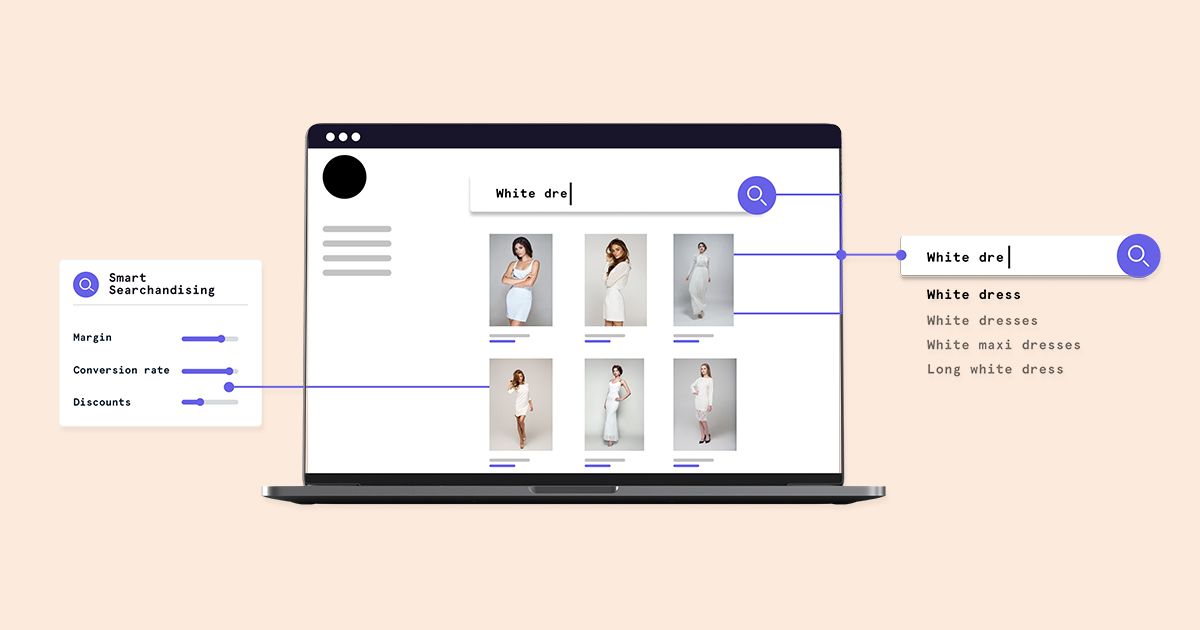
Product experience cloud
- Personalized search to enable hyper-relevant customer engagement, product discovery, and online revenue.
- Category merchandising for controlled product sorting.
- Product recommendations based on customer data, aimed at boosting purchases.
- Dynamic bundles suggest complementary products, encourage upsells, and drive AOV.
- Personalized emails with embedded product recommendations.
Content experience cloud
- Content personalization across site elements like hero banners, menus, videos, and more.
- Behavioral pop-ups that are timely and fully customizable.
- UGC publisher center for managing user-generated content across multiple digital touchpoints.
- Ambassador builder for managing and rewarding a loyal community of brand advocates.
Nosto pricing
Nosto’s pricing is not openly available on its website, but you can book a demo or contact the brand’s sales team for a quote.

Nosto pros and cons
✅ Easy integration
✅ Responsive and hands-on support
✅ Flexible customization
❌ Inadequate analytics
❌ Algorithm limitations
#3 - Bloomreach
Bloomreach is a cloud-based e-commerce experience platform with product discovery, marketing automation, conversational shopping, and content management capabilities.
Best for: Omnichannel marketing automation.
Similar to: Klaviyo, Omnisend.
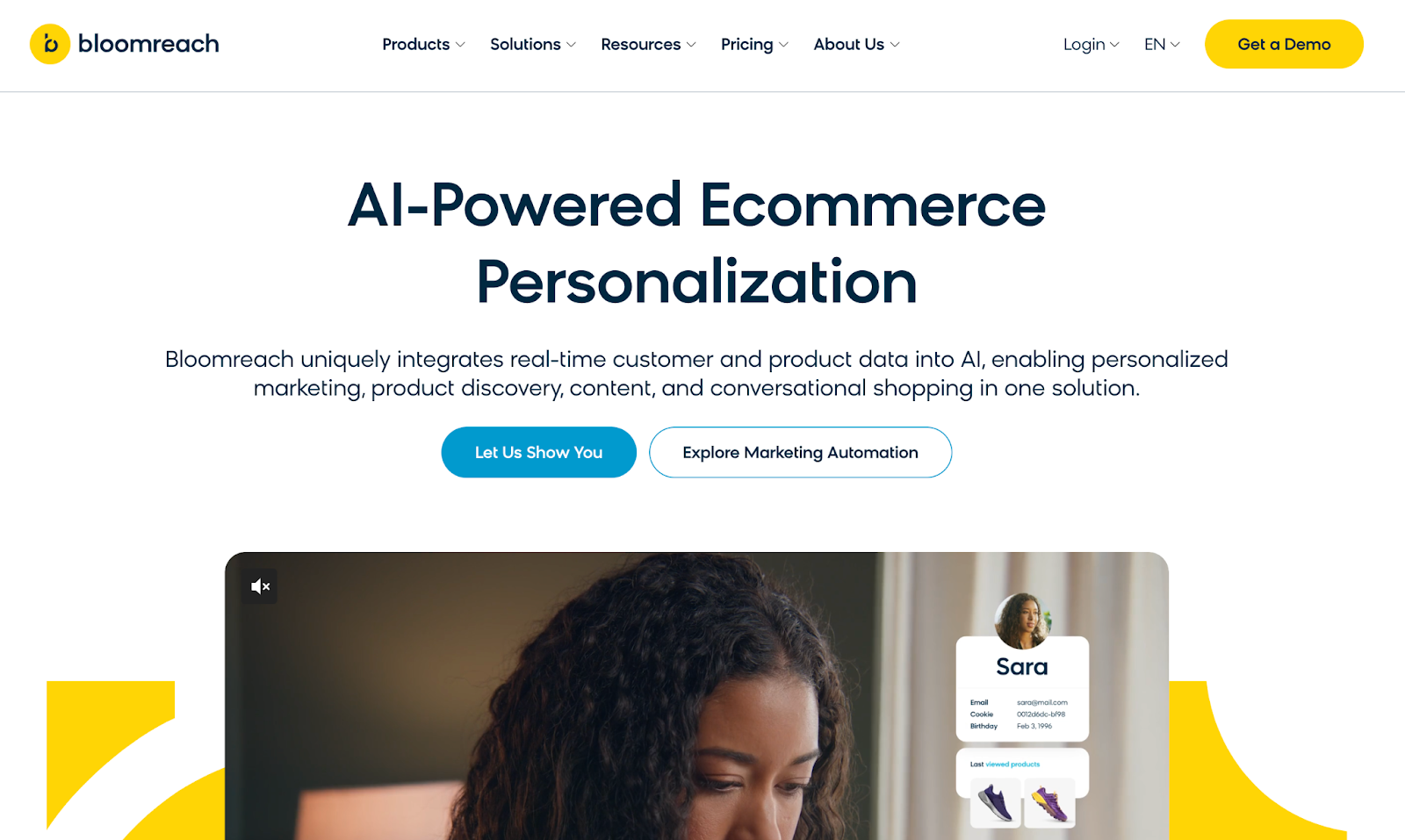
Bloomreach is a strong Algolia alternative if you care about personalizing marketing campaigns over search and store optimization. Search and conversational shopping features aren’t on par with Algolia or newcomers like BigSurAI.
Who is it for?
While Bloomreach may be too advanced for small businesses, it works well for large e-commerce brands. It is best suited for merchandisers and marketers.
Bloomreach features
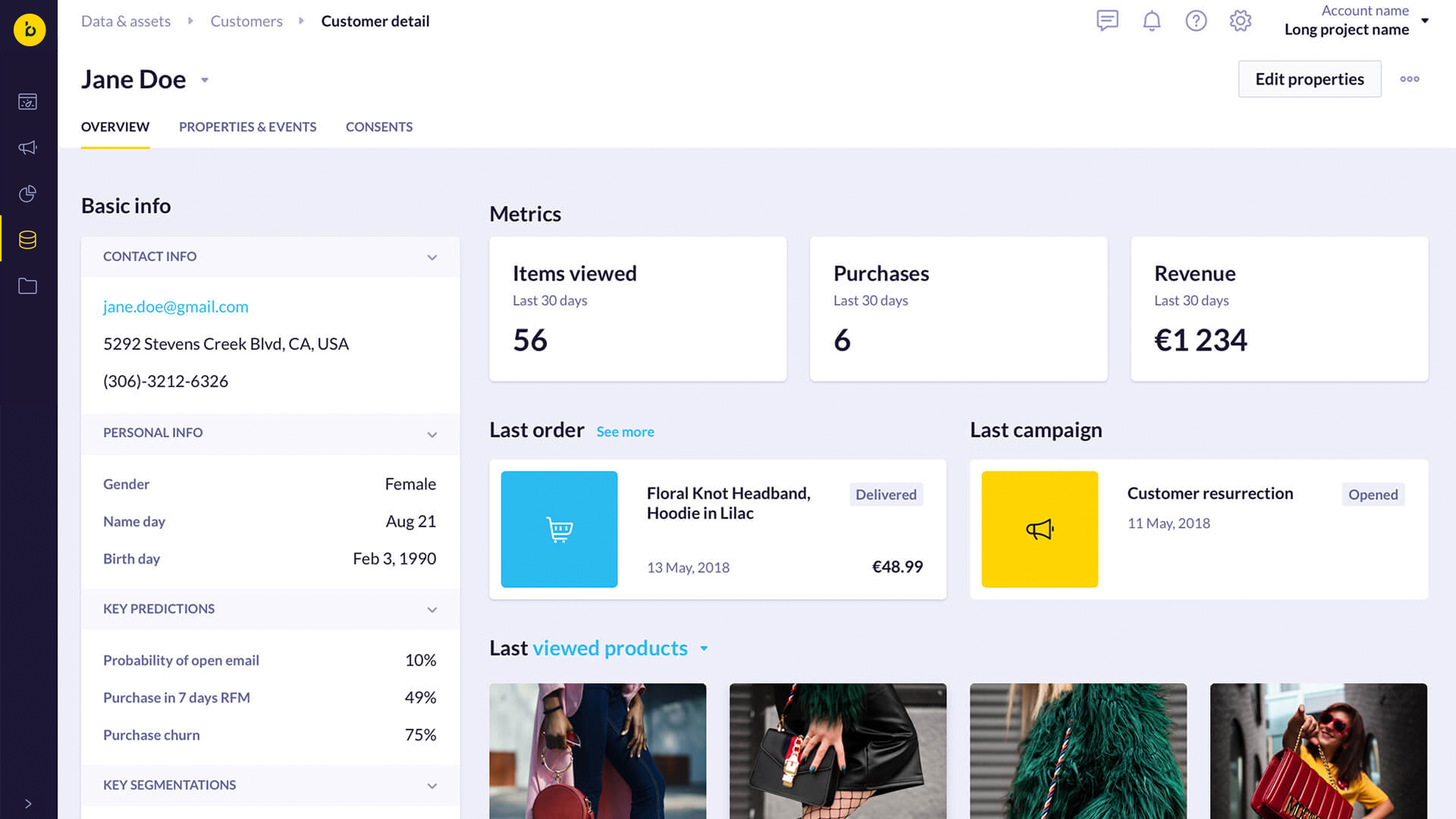
For Marketers
- Real-time data and AI to fuel marketing campaigns and shopping experiences. With its flexible testing and optimization feature, you can go from theory to results without relying too much on developers.
- Ability to personalize marketing campaigns across email, SMS, ads, dynamic website pages and mobile messaging.
- AB test campaigns across channels. Get out-of-the-box analytics and customer insights.
For Merchandisers
- Library of plug-and-play workflows to help you get started quickly.
- Bloomreach Discovery allows for tailored recommendations to your customers’ search queries, like adjusting results based on website activity.
- Product recommendations at key conversion points.
- Headless content management system (CMS) to push new products and content to your site.
Bloomreach pricing
Bloomreach has three pricing packages for different feature sets.
❗Bloomreach customers often need to subscribe to multiple plans to get what they want from the platform.
- Engagement: Includes email marketing, SMS, ad optimization and other marketing features.
- Discovery: Site search and other store optimization features like Product recommendations.
- Content: Dynamic landing pages, website AB testing, CMS, and more.

💡 Note that Bloomreach’s Subscription costs aren’t public, you’ll need to request a demo or contact sales to get a quote.
Bloomreach pros and cons
✅ Ability to tailor campaigns with data and AI
✅ Customizable for multiple industries
✅ Large library of plug-and-play components
❌ Overwhelming amount of features
❌ Performance issues, especially at scale
#4 - Doofinder
Doofinder is a smart site search engine that improves product visibility and conversions on online stores. It uses insights from customer queries to understand user needs and improve content and offerings for best results.
Best for: Shopify site search.
Similar to: Luigi’s Box, Boost Commerce.
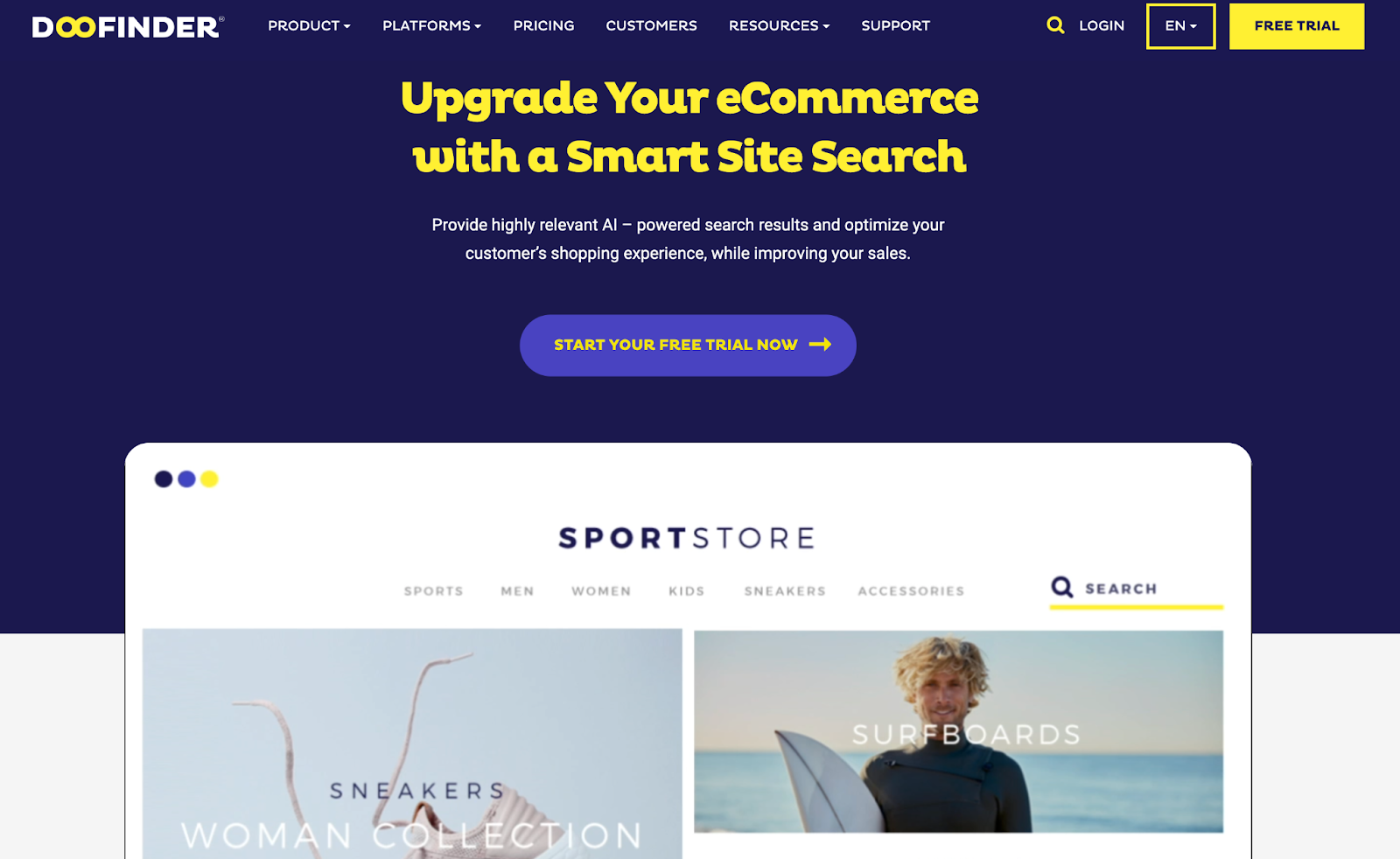
Algolia promotes all integrations equally. Doofinder, on the other hand, focuses more on its Shopify integration.
Who is it for?
With simple, affordable pricing tiers, Doofinder is best suited for small and medium-sized businesses.
Doofinder features
- Smart AI search for recognizing synonyms and adapting results to customer profiles and behaviours.
- Searchandising tools like banners, boosting, and more.
- Autocomplete that preempts user queries and suggests results before they finish typing their search term.

- Voice search on mobile, that lets customers shop at their convenience.
- Search interface for designing the look and feel of your site’s search experience.
- Statistics and insights dashboard for viewing and optimizing search performance.
- Recommendations that drive purchases.
Doofinder pricing
Doofinder offers a 30-day free trial and a limited free plan subsequently.
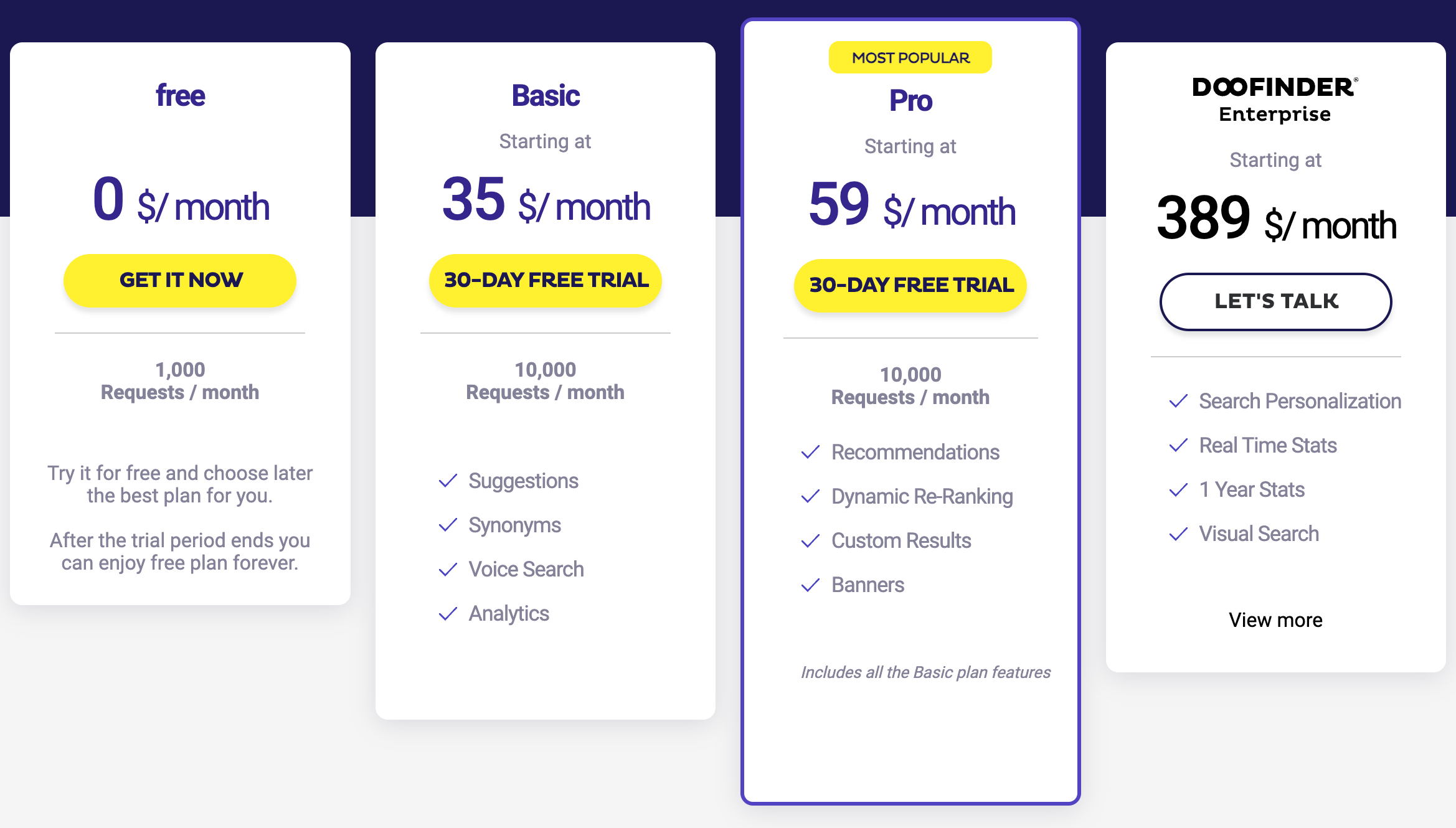
Paid packages include:
- Basic: Starts at $35/month
- Pro: Starts at $59/month
- Enterprise: Starts at $389/month
Doofinder pros and cons
✅ Cost transparency
✅ Search result speed and quality
✅ Smooth onboarding process
❌ Can get pricey with more API calls and website traffic
❌ Limited third-party integrations
#5 - Yext
Yext offers a comprehensive suite of products for enhancing a business’s online reputation and ROI, including a search solution similar to Algolia.
Best for: Digital presence management for multi-location brands.
Similar to: Luigi’s Box, Boost Commerce.

The biggest difference between Yext and Algolia is that the former specializes in online presence optimization while the latter is all about AI search and discovery.
Who is it for?
Yext markets its site search tool as an enterprise solution.
Yext features
- Listings tool for managing and optimizing your business’ location information across the web.
- Reviews functionality for reputation management and boosting local ratings and search engine rankings.
- Search feature for creating a unique website search experience
- Social tool that lets you localize the content of one social post and syndicate it across multiple locations and networks in one click.
- Chat automation powered by an AI bot.
- Content management system that enables search.
- Analytics dashboard with actionable insights.
Yext pricing
Yext offers different pricing options for its suite of tools so it might get overwhelming. Request a demo with the team to get a quote for its search solution.
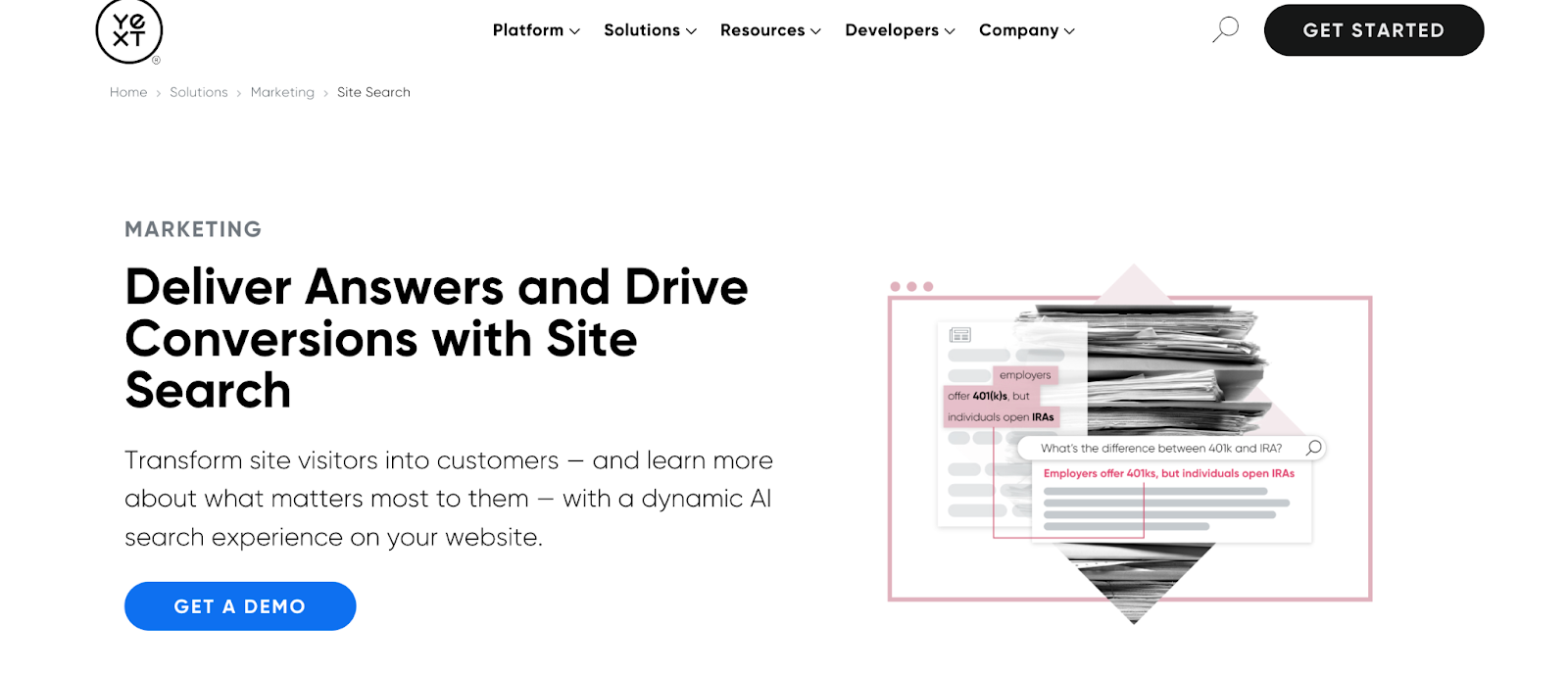
Yext pros and cons
✅ Extensive capabilities beyond site search
✅ Great account management
✅ Easy to navigate
❌ Confusing product-specific terms
❌ Manual data syncing
#6 - HawkSearch
HawkSearch leverages AI intelligence to study customer behaviour and personalize their search experience. The app is optimized to drive traffic, boost sales conversions, and raise AOV significantly.
Best for: Multiple search options (keyword, concept, visual, and image).
Similar to: Salesfire Search, Zoovu Search Studio.

Algolia and HawkSearch specialize in different industries. Algolia handles ecommerce, SaaS, media, and marketplaces while HawkSearch focuses on online retail, higher education, associations, healthcare, government agencies, and more.
Who is it for?
Businesses and organizations looking for a low-code site search tool.
HawkSearch features
- Smart search functionality that helps site visitors find the right results; includes keyword, concept, visual, and image search.
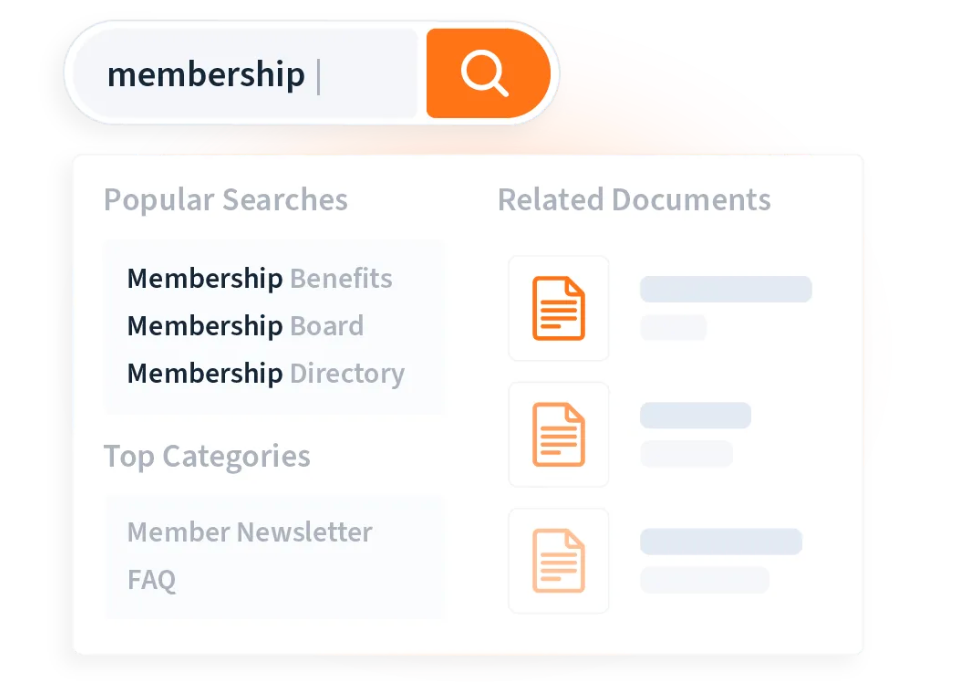
- Merchandising tool for finetuning search results and managing item visibility.
- Recommendations (product and content) and item comparisons based on pages visited, best sellers, trending products, and more.
HawkSearch pricing
HawkSearch pricing starts at $450/month with dedicated support available on all plans:

- Core (for basic use): $450/month
- Premium (with advanced features): $750/month
- Enterprise (for scaling up): Starts at $1250/month
HawkSearch pros and cons
✅ Highly customizable search results
✅ Great training and onboarding
✅ Supports up to 50 languages
❌ Poor Handlebars integration
❌ Steep learning curve for first-time and non-technical users
#7 - FactFinder
FactFinder is a product discovery solution that combines human and AI intelligence. The platform helps online stores give their shoppers personalized and fast answers to queries, increasing conversion rates and sales.
Best for: Conversion rate optimization.
Similar to: Searchspring, Searchanise.

FactFinder is custom-built for online retail while Algolia caters to multiple industries and use cases.
Who is it for?
FactFinder has a dual B2C and B2B ecommerce focus. Its unique features like predictive restock reminders make it an ideal option for industries like food and pharmacy that thrive on recurring purchases.
FactFinder features
- Product discovery: Powerful search, ranking rules, filters, and an analytics suite that helps your customers find what they’re looking for quickly.

- Customer-specific info: The app considers data like location and purchase history to show varying pricing tiers, discounts, and product ranges to each unique buyer.
- Predictive basket: This tool anticipates customer needs based on when past purchases will likely run out and suggests relevant products accordingly.
- Navigation: Product lists for category pages which simplify store browsing and limit manual effort.
FactFinder pricing
FactFinder’s pricing is not publicly available.
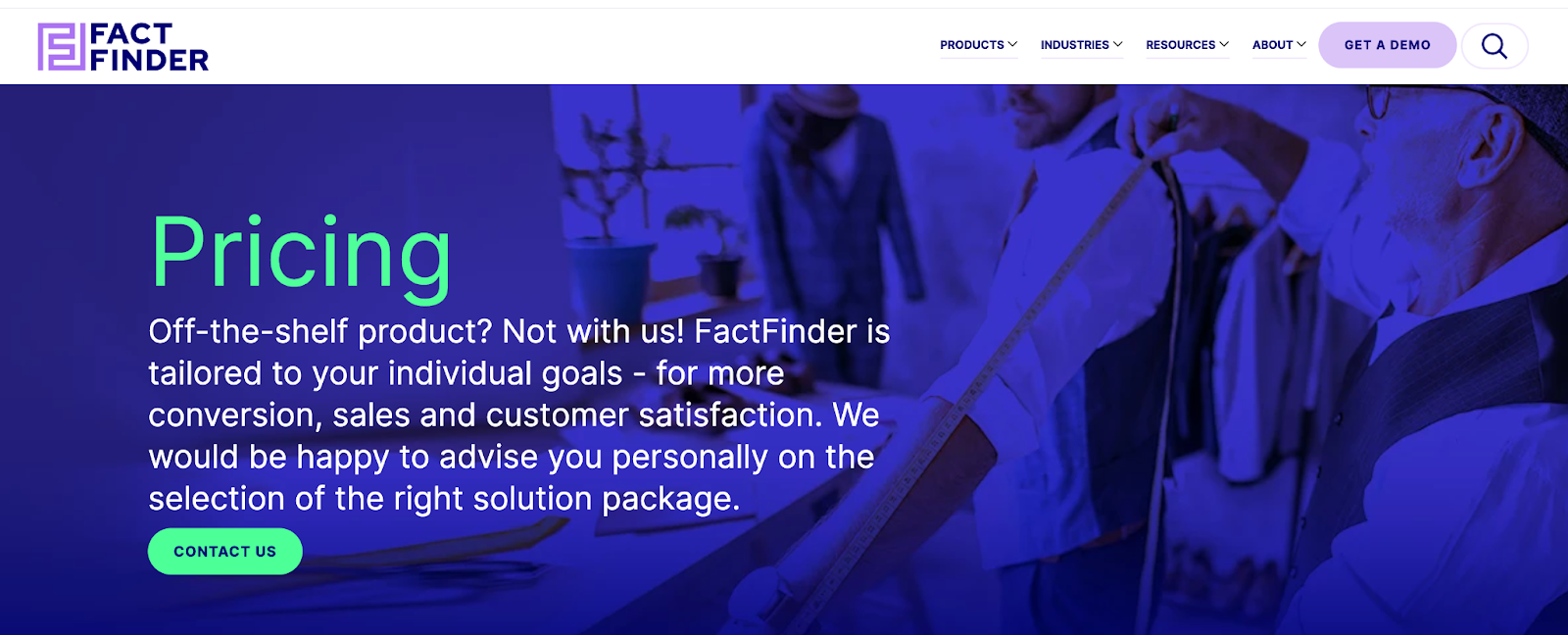
But, you can get a personalized quote by contacting the team with requirements on product(s), modules, monthly searches, and the channels you want.
FactFinder pros and cons
✅ Typo tolerance
✅ Language independence
✅ Headless compatibility
❌ Hosting and implementation challenges due to inadequate user guidance
❌ Occasional backend issues despite responsive customer service team
#8 - Coveo
Coveo provides an enterprise search tool and AI personalization software for multiple industries. It helps you give customers and employees relevant and personalized digital experiences.
Best for: AI search and generative experiences
Similar to: Glean, GoLinks.
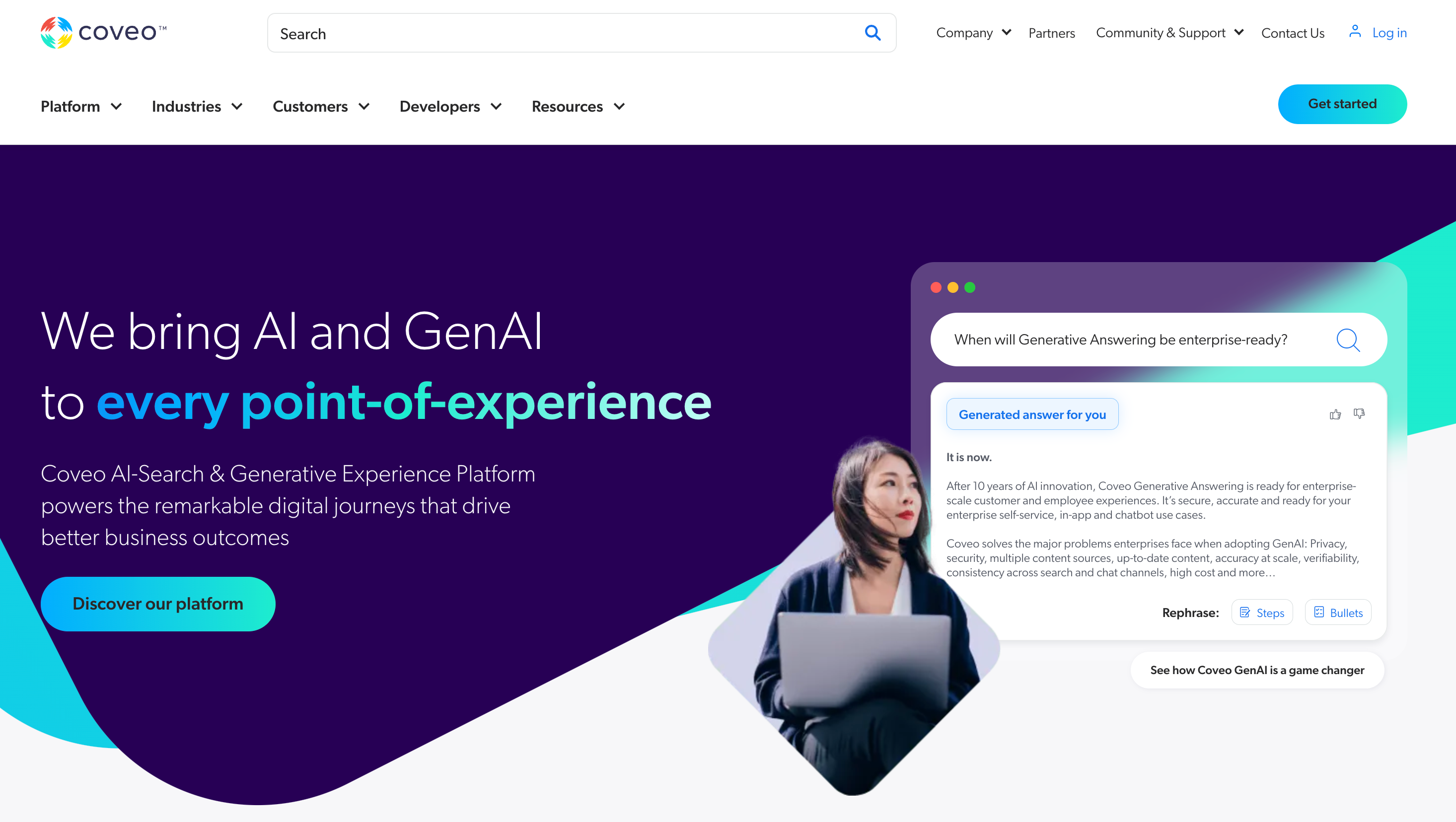
Unlike Algolia, Coveo supports GPT-like prompting on website searches but will require involvement from your IT team.
Who is it for?
Coveo is popular among enterprise-grade companies. So far, it caters to companies in the high-tech, healthcare, financial services, telecommunication, manufacturing, and retail sectors.
Coveo features
- Ecommerce: AI product discovery via predictive search, personalization, and merchandising capabilities.

- Service and support: Boosts first contact resolutions by empowering support agents with automatic content recommendations relevant to resolving a ticket and customer search and view history.
- Website: Attracts high-intent inbound leads by analyzing query intent and context and presenting website users with the most relevant information.
- Workplace: Provides a central, secure location for search, answers, advice, and conversations. It seamlessly integrates with workspaces like Slack, Confluence, Salesforce, and more.
Coveo pricing
Coveo has two pricing plans: Pro (basic) and Enterprise (advanced). While their subscription fees aren’t live on the site, you can contact the Coveo team for more details.
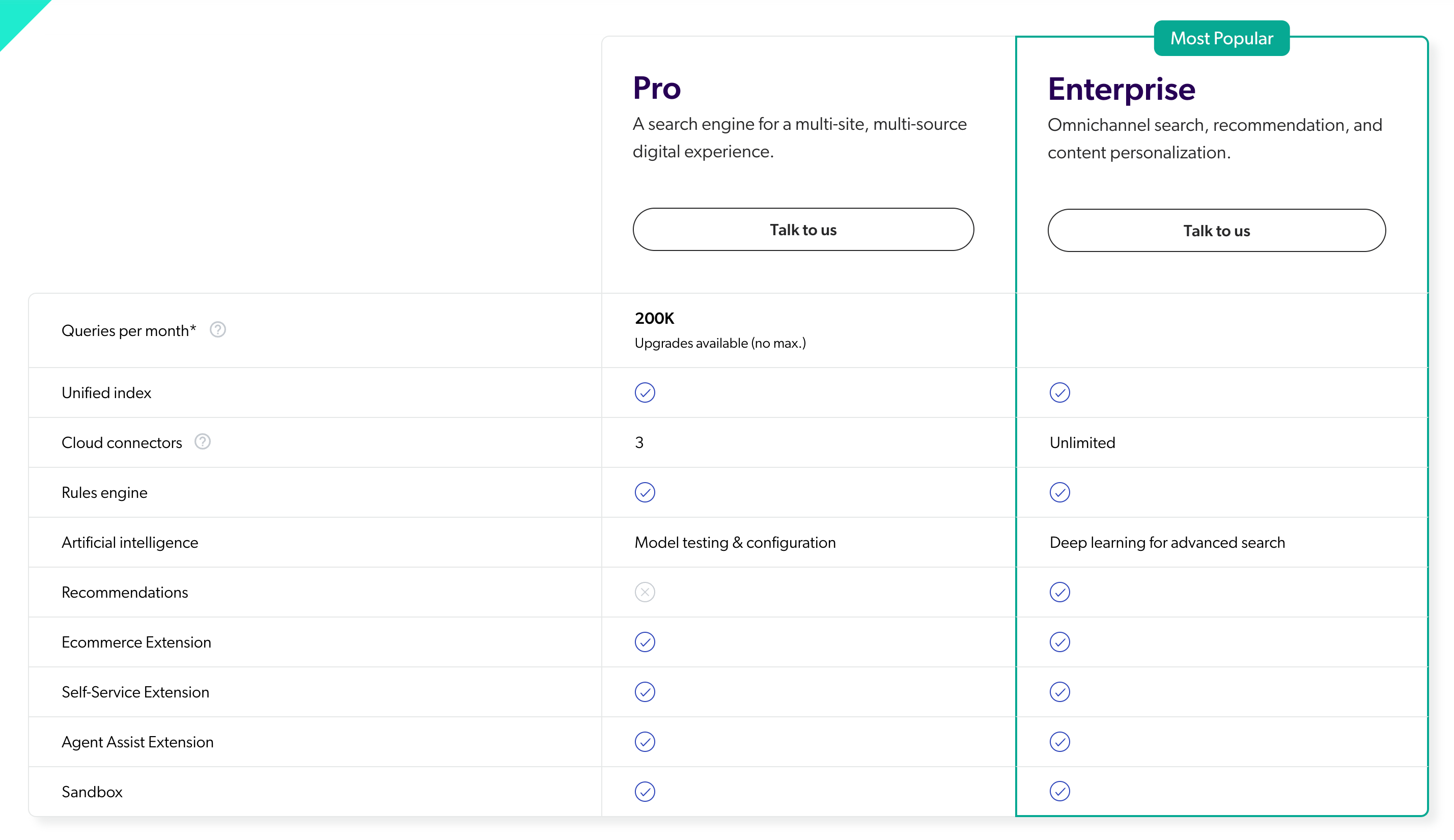
Coveo also offers a full-access, 14-day free trial, and online reviews claim that its paid packages start at $600/month and go up to seven figures.
Coveo pros and cons
✅ Intelligent search results
✅ Scalable platform
✅ Granular reporting capabilities
❌ Limited mobile experience compared to its desktop version
❌ High maintenance overhead, especially for smaller businesses with no dedicated IT teams or budgets.
Power high-converting search experiences with Big Sur AI
No doubt — all the eight search solutions we analyzed are great.
Your ideal option depends on whether you want a custom solution for growing e-commerce sales through faceted search or need a more general search tool with tons of use cases.
With Big Sur AI's simple integration, you can elevate your store search experience in minutes. The app does not require any complex setup and it scales effortlessly with your brand’s growing needs.
Big Sur AI is also more affordable to implement than Algolia, so you don’t have to break the bank to use it.

